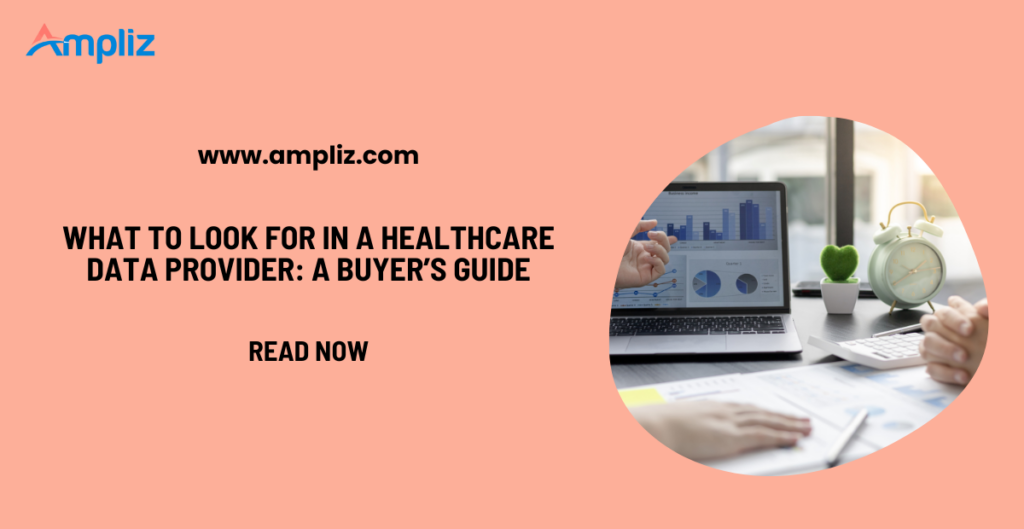In the era of data-driven decision-making, having access to high-quality healthcare data is no longer optional—it’s a necessity. From B2B healthcare marketers and sales teams to life sciences companies and MedTech startups, organizations across the healthcare ecosystem rely on accurate and actionable data to reach the right people at the right time.
But not all healthcare data providers are created equal. Choosing the wrong one can lead to wasted resources, compliance risks, and poor ROI. In this buyer’s guide, we’ll walk you through the key factors you need to consider before selecting a healthcare data vendor that aligns with your goals.
Understand Your Data Needs
Before diving into vendor comparisons, define what you need the data for. Are you generating healthcare leads? Are you targeting hospitals, physicians, or insurance payers? Do you need real-time updates, historical trends, or both?
Consider:
- Your target audience (e.g., cardiologists, hospital execs)
- Use case (email campaigns, sales outreach, predictive analytics)
- Data types required (claims, EMR, NPI, affiliations)
Why it matters: Understanding your goals will help narrow down vendors who offer the exact dataset and platform functionality that suits your business model.
Key Qualities of a Reliable Healthcare Data Provider
A trustworthy healthcare data provider should demonstrate the following:
- Accuracy: The data must be validated regularly to eliminate outdated or incorrect records.
- Recency: Providers should update their databases frequently (ideally monthly).
- Breadth & Depth: Look for providers with extensive coverage—by specialty, geography, and facility type.
- Source Diversity: Reputable vendors compile data from multiple verified sources (claims, NPI, CMS, affiliations).
Why it matters: Inaccurate or incomplete data can derail campaigns, impact compliance, and erode trust in your brand.
Compliance and Security Considerations
Healthcare data is sensitive, and mishandling it can lead to serious legal trouble. Make sure your data provider follows strict compliance protocols, such as:
- HIPAA Compliance: Ensures patient data privacy.
- SOC 2 Certification: Indicates adherence to security and data protection standards.
- GDPR Compliance (if applicable): Critical if you’re targeting EU-based HCPs or organizations.
- Consent Management: Opt-in and data usage rights must be clearly managed.
Why it matters: Compliance isn’t just about following laws—it’s about maintaining credibility and trust in your marketing and sales practices.
Types of Data Offered
Depending on your strategy, you might need access to a mix of different healthcare datasets:
- Physician and HCP Database: Includes contact info, specialties, NPI, prescribing behavior.
- Hospital and Facility Data: Net patient revenue, affiliations, bed counts, specialties.
- Claims & EMR Data: Helps identify treatment trends, high-volume hospitals, and referral patterns.
- Intent & Behavioral Data: Advanced providers also track physician interests, online behaviors, and research activity.
Why it matters: The more comprehensive the data, the more precise your targeting will be.
Platform Features & Usability
Having good data is only half the equation—accessing and using it efficiently is just as important. Evaluate the provider’s platform for:
- User Interface: Is it easy to navigate and filter?
- CRM Integrations: Does it connect seamlessly with Salesforce, HubSpot, or Marketo?
- API Access: Can you automate workflows or enrich data in real-time?
- Custom List Building: Advanced filters for segmentation based on multiple parameters.
Why it matters: Time is money. A user-friendly platform helps you go from search to outreach faster.
Support, Onboarding & Customization
A high-quality provider should offer dedicated onboarding and post-sale support, such as:
- Training and Tutorials: For fast adoption across teams.
- Dedicated Account Managers: For support, strategy, and troubleshooting.
- Customization Capabilities: Ability to segment or tailor lists to fit unique use cases.
Why it matters: The level of support determines how much value you actually get from your subscription.
Pricing and ROI Considerations
Not all vendors are transparent about pricing. Some offer usage-based pricing, while others charge per user or dataset. Consider:
- Demo or Free Trial Availability
- Scalability of Cost as You Grow
- Included Features vs Add-ons
- Projected ROI vs Investment
Why it matters: High upfront cost doesn’t always mean better quality. Look at long-term ROI and value delivery.
Questions to Ask Before You Choose
Here’s a checklist of essential questions:
- How frequently is your data updated?
- Do you provide access to claims or EMR data?
- How do you verify your data?
- Can we integrate your platform with our CRM?
- What compliance certifications do you have?
- Can we request custom data sets?
Red Flags to Watch Out For
Watch for these signs that a provider might not be reliable:
- Poor or outdated interface
- Lack of compliance documentation
- Generic or non-segmented data
- No demo or trial available
- No clear update frequency
- Hidden fees
Why it matters: Red flags early on can save you from costly disappointments later.
10. Comparing Top Providers in the Market
It’s often helpful to evaluate leading providers side-by-side. Consider creating a comparison based on:
| Provider | Data Accuracy | EMR/Claims Access | CRM Integration | HIPAA/SOC 2 | Support |
|---|---|---|---|---|---|
| Ampliz | ✅ High | ✅ Yes | ✅ Yes | ✅ Certified | ✅ Yes |
| Definitive Healthcare | ✅ High | ❌ No | ✅ Yes | ✅ Certified | ✅ Yes |
| ZoomInfo Healthcare | ⚠️ Moderate | ❌ No | ✅ Yes | ❌ Partial | ⚠️ Limited |
Why it matters: Having a structured view helps you justify decisions internally with data.
Conclusion
Choosing the right healthcare data provider is a critical decision that influences your marketing reach, campaign success, and overall ROI. By prioritizing data accuracy, platform usability, compliance, and post-sale support, you’ll ensure that your investment yields long-term value.
Take your time, ask tough questions, and always test before committing.
Final Tip: Platforms like Ampliz offer high-accuracy, compliance-ready data with EMR insights and deep targeting features—ideal for B2B marketers and sales teams in healthcare.
❓ FAQs
Q1. What is the most important factor when choosing a healthcare data provider?
A: Data accuracy and update frequency are the most critical factors, followed by compliance and CRM integration capabilities.
Q2. How often should healthcare data be updated?
A: Monthly updates are ideal. Quarterly updates may suffice for less dynamic datasets like hospital affiliations.
Q3. What data types should I look for as a healthcare marketer?
A: Physician contact data, hospital revenue data, NPI records, EMR/claims data, and intent data are essential for effective targeting.
Q4. Is HIPAA compliance mandatory for B2B healthcare data?
A: While not always required, HIPAA compliance ensures ethical handling of sensitive healthcare-related information and enhances credibility.


